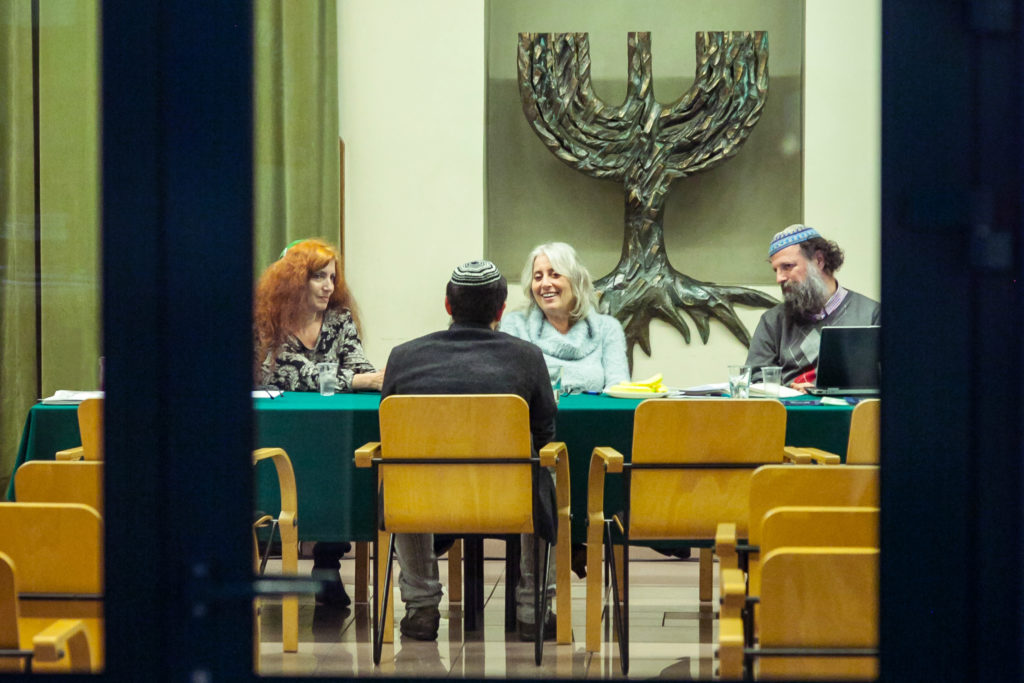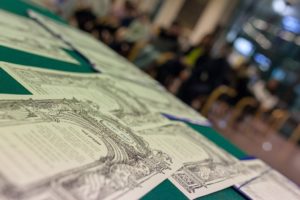Polish Beit Din department of Center for Progressive and Reform Judaism is the first post-war polish rabbinical court which makes decisions in matters connected Jewish life, such as conversions, divorces and other matters connected to Jewish Law (Halakha).
To inquire more about the conversion process in Beit Krakow Jewish Progressive Community please read here (in Polish)
The Press Release:
for more information please contact us at office@tempel.pl
 The day before Hannukah, December 11th, 2017, the first post-war Polish Beit Din assembled in Krakow. The Beit Din was established under the auspices of the Center for Progressive Judaism in Krakow and the Beit Krakow Progressive Jewish Community (first post-war Progressive Jewish Community in Krakow).
The day before Hannukah, December 11th, 2017, the first post-war Polish Beit Din assembled in Krakow. The Beit Din was established under the auspices of the Center for Progressive Judaism in Krakow and the Beit Krakow Progressive Jewish Community (first post-war Progressive Jewish Community in Krakow).
For ages, the city of Krakow was the center of Jewish spirituality and thought for Jews from Galitzya and Silesia and a cradle of Ashkenazi tradition as we know it today. In the second half of the nineteenth century, it was also the center of the Jewish Enlightenment.
The Polish Beit Din was comprised of rabbis, who had either committed years of their work to the Jewish community in Poland or who have Polish roots. These were Rabbi Boaz Pash, the Chief Rabbi of Krakow from 2006-2012; Rabbi Tanya Segal, rabbi of progressive Jewish community Beit Krakow, the first woman Rabbi in the history of Poland, who has been working in Poland for the past 10 years; and Rabbi Mira Raz, an Israeli Rabbi whose own family story is tragically connected to Poland through history and the language she remembers her parents speaking at home.
The Beit Din assembled in order to decide on matters of conversion to Judaism and met with 10 candidates from Poland and from a Czech city Krnov (Karinów), located on the Czech-Polish border, in the region of Silesia. Conversion to Judaism is a long and difficult process, which culminates with a meeting with the Beit Din. All candidates were up to the challenge and have been accepted into the Nation of Israel.
This is how the Rabbis themselves spoke about this momentous occasion:
Rabbi Mira Raz said: “I felt very privileged to be a part of the Beit Din in Krakow. For me, this was the missing link in my relations with Poland as a Jew. My family roots in Sosnowiec/Zawiercie were cruelly uprooted in the past, but in the present, I, as a member of this historical Beit Din in Krakow, took part in planting new Jewish roots in Europe. These ten people moved me so much with their sincerity and conviction to become Jewish. What remained to say is: Am Israel Chai (the people of Israel live) – they are a living proof of that.”
Rabbi Boaz Pash said: “It was as if we had known each other for a long time as if we were meeting dear brothers and sisters who had lost their way a little, and now were returning home. We felt we must have met once, perhaps at Mount Sinai, when we all received the Torah together. And at the end, after the immersion in the mikvah (ritual bath) and after the court, when we sat together singing “Hinei ma tov uma naim shevet achim gam yachad…” (how good and pleasant it is for us to be together) I felt complete. Whole. I felt that something which was lost was returned to its place; the family was reunited.”
Rabbi Tanya Segal said: “Contemporary development of Jewish life in Poland is a phenomenon which cannot be compared to any other. This is the place where centuries of Jewish history and tragic events of the Shoah (Holocaust) influence every aspect of our life, every thought in our mind, and define unique guidelines for our response to the questions of today. Rabbis from all different movements formed the first post-war Polish Beit Din. This is maybe the only place where close cooperation between all movements of Judaism is possible.”
The Beit Din also received a delegation of the Management Board of the Jewish Community in Ostrava (Czech Republic), which came to support the candidates from Krnov. In a very moving speech, the Chair of the Jewish Community in Ostrava, Ms. Milena Slaninova, said: “We are extremely happy that all the people have succeeded. They are like our children, whom we have been waiting for so long. We look forward to accepting them officially as members of Jewish Community as soon as possible.”
The session of the Beit Din itself took place in the historic space of a former Beit Midrash (house of study), Bnei Emuna. The building is now under the care of the Judaica Foundation’s Centre for Jewish culture, a unique institution which, for the last 25 years, has been educating about and promoting Jewish art and culture in the Jewish district of Krakow.
This historic event permanently re-establishes an autonomous Polish Beit Din in Poland, which in itself is a true testimony to the gradual strengthening and growth of the local community. The Polish Beit Din has been established as a branch of the Center for Progressive Judaism in Krakow to serve the local community and communities in the region of Central Europe.
for more information please contact us at office@tempel.pl


